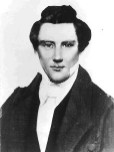
FAIR is a non-profit organization dedicated to providing well-documented answers to criticisms of the doctrine, practice, and history of The Church of Jesus Christ of Latter-day Saints.
| Answers portal |
| Joseph Smith, Jr. |

|
|
|
|
|
No mortal's role in the judgment supercedes the role given to Jesus, as the Book of Mormon bears witness:
Joseph's participation in the judgment (at the command and sufferance of Jesus) is no more or less than the role assigned to the Lord's apostles at the Last Supper. Those who condemn Joseph on these grounds must also condemn Peter and the rest of the Twelve.
Members of the Church reserve their worship for God the Father, in the name of Jesus Christ, by the power of the Holy Ghost. They do not worship Joseph Smith or any other mortal, save Jesus only. Joseph Smith's position in LDS thought is analogous to the role which Peter or Paul plays in traditional creedal Christianity.
The criticism originates with statements made by Brigham Young and Orson Hyde that are recorded in the Journal of Discourses. Statements made by these early church leaders are removed from their context in order to make it appear that a belief in Joseph Smith rather than Jesus Christ is the key to salvation.
When read in context, Brigham Young's statement and intent become clear:
Clearly, Joseph's role is to function under the "direction...of the Son of God," and the primary goal is the salvation of all who will accept any degree of Christ and Joseph's witness of Him.
Similarly, critics extract the second sentence of the following quote from Brigham Young, while ignoring the sentence preceeding it (emphasis added):
It is not a novel idea to have mortal prophets involved in the post-mortal judgment. At the Last Supper, Jesus himself taught that:
A similar promise to participate in the judgment of those among whom they were called to serve was given to the twelve Nephite Disciples (see 1 Nephi 12:9-10). This principle is also reiterated in modern revelation (see D&C 29:12).
Since the Latter-day Saints accept the witness that Joseph was called as an apostle and prophet (see D&C 21:1) with the same authority as that given to Peter, James, John, and others, they do not think it strange that he will likewise play a role in judgment. The witness of a prophet will always be brought against those who did not accept his witness of Christ (see Matthew 10:40; John 5:45-47).
To see citations to the critical sources for these claims, [[../CriticalSources|click here]]
Notes

FAIR is a non-profit organization dedicated to providing well-documented answers to criticisms of the doctrine, practice, and history of The Church of Jesus Christ of Latter-day Saints.
We are a volunteer organization. We invite you to give back.
Donate Now